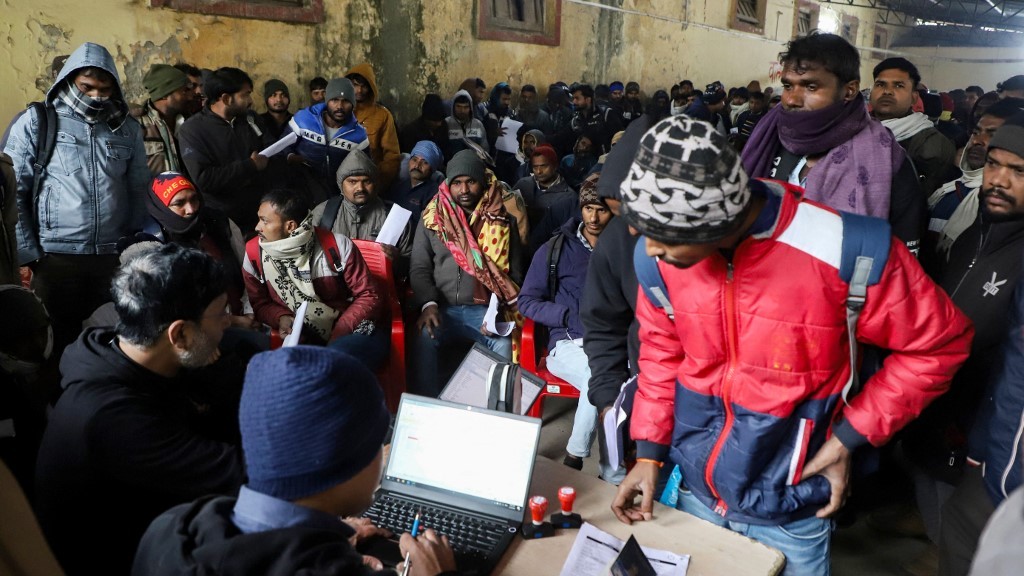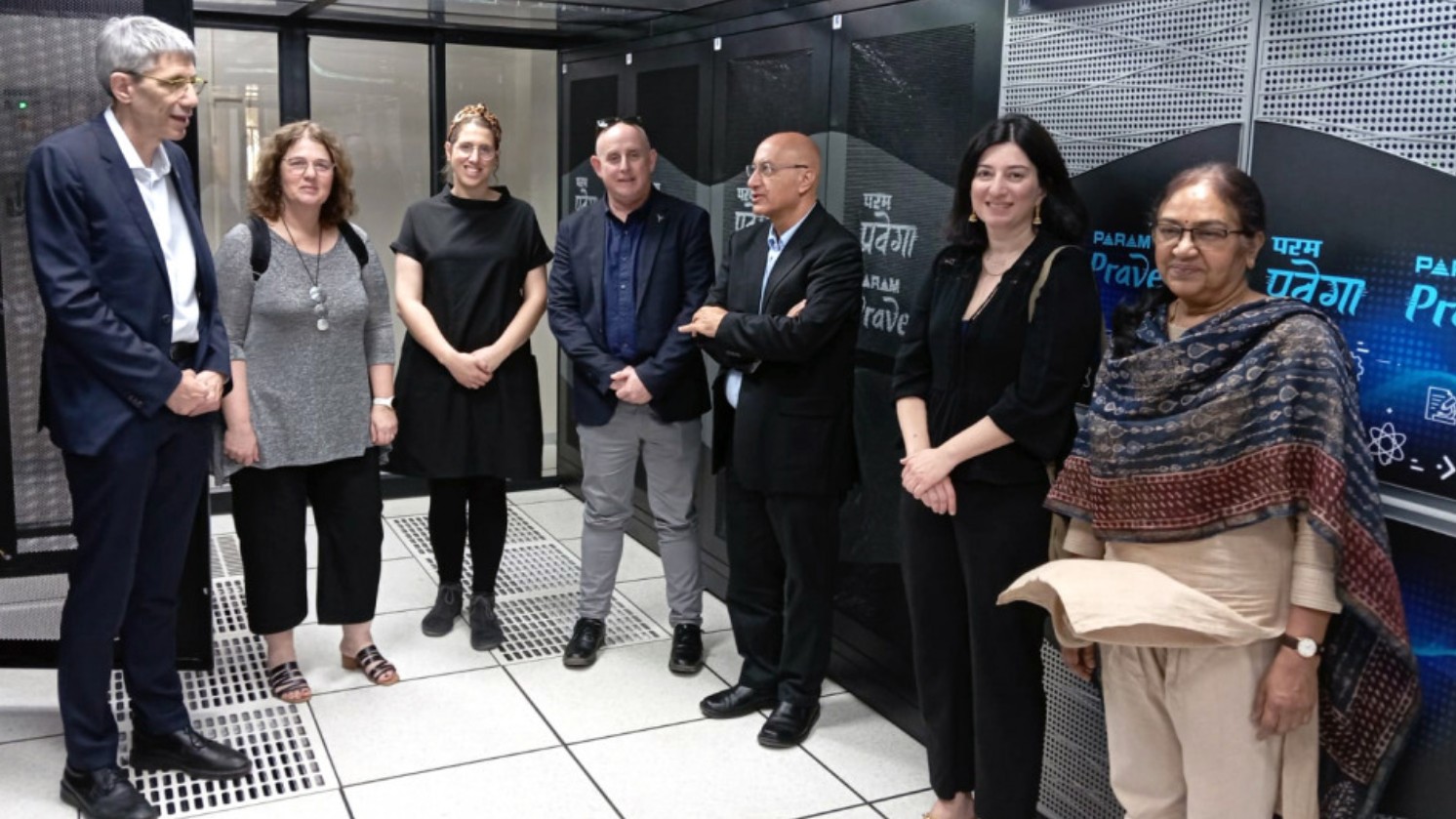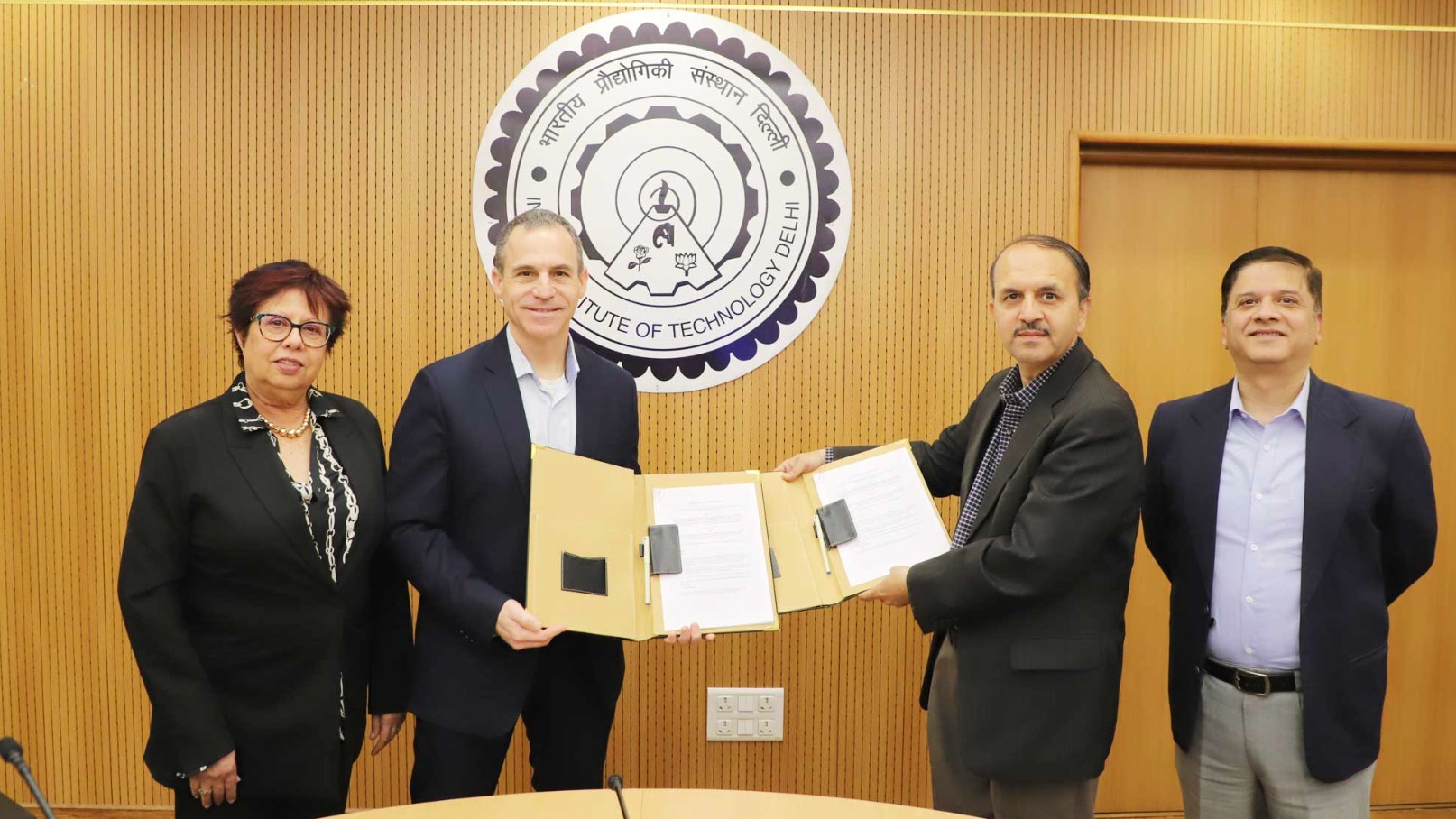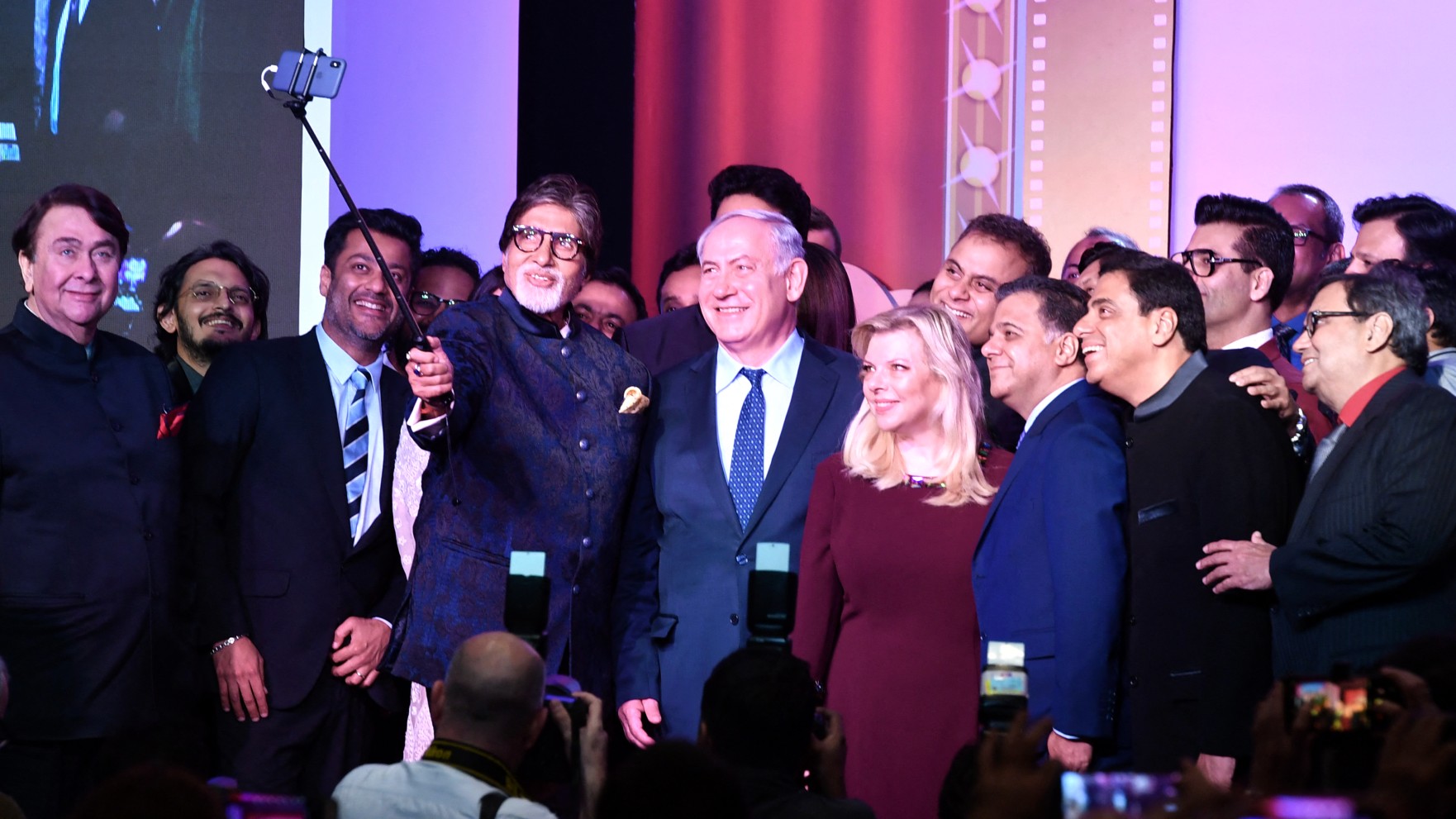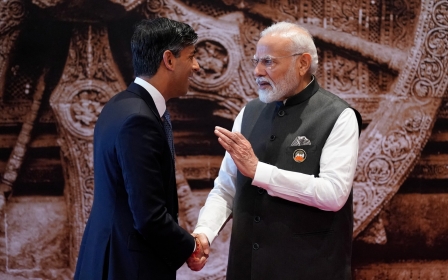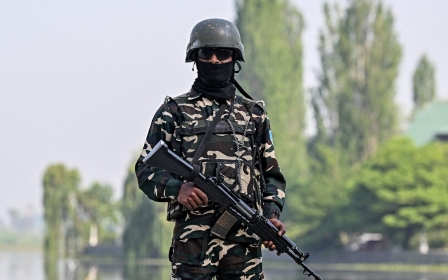Indian universities build closer ties with Israeli colleges and arms firms despite Gaza war
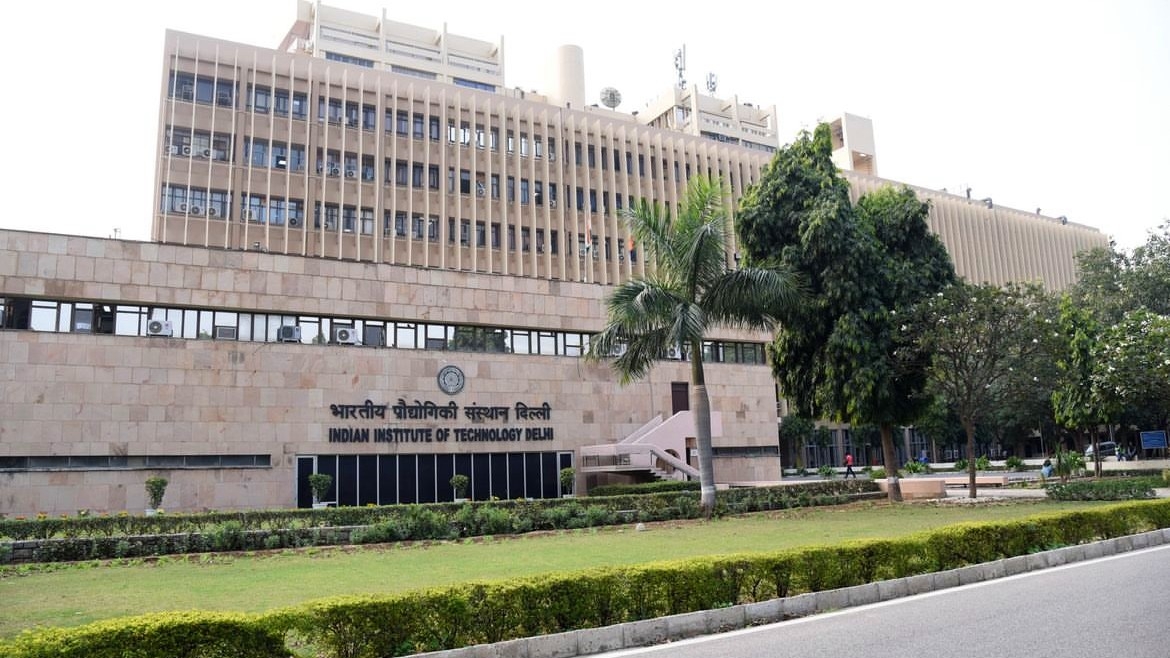
Indian universities have deepened research ties with Israeli colleges and weapons companies since the start of the war on Gaza, despite several institutions in the US and UK being forced to rethink exchanges as the death toll spirals, Middle East Eye can reveal.
In recent months, Indian universities have increased partnerships in the fields of defence, robotics and artificial intelligence (AI), with Israeli universities alleged to be complicit in the months-long conflict. Several are now either directly working with Israeli weapons companies or with Indian companies reported to have sent weaponry to Israel.
The partnerships, some publicly announced, have fuelled speculation that Israel is engineering closer ties with Indian universities - especially in the sciences - to build not only new hubs of defence and technology research for its armed forces but also as a means of exerting influence on Indian academia.
According to an MEE tally, there have been more than a dozen meetings, workshops and agreements signed between Indian universities and Israeli universities and weapons companies since the International Court of Justice (ICJ) found it was plausible Israel was committing genocide in Gaza.
Experts and analysts told MEE that the agreements could be part of an attempt by Israel to lean into India's university system to feed its growing appetite for military hardware and technological development, as well as diversify its partnerships at a time when several universities are being urged to boycott and divest from Israel and its war.
New MEE newsletter: Jerusalem Dispatch
Sign up to get the latest insights and analysis on Israel-Palestine, alongside Turkey Unpacked and other MEE newsletters
Maya Wind, the author of Towers of Ivory and Steel: How Israeli Universities Deny Palestinian Freedom, told MEE that several Israeli institutions were in "panic" mode about the prospect of academic boycotts in the United States and Europe, following the recent college campus protests.
"Israeli academics are raising concerns about being disinvited from collaborations, losing grants, losing legitimacy, getting pariah status, this is all they are talking about right now," Wind said.
"There is an absolute panic over the growing traction of the academic boycott and the severing of institutional ties. Hebrew University sent out materials to its faculty with talking points to counter the boycott. The turn to India may be a way to shore up other sources of funding," she added.
'A strategic priority'
In early February, Oron Shagrir, the vice president for international affairs at the Hebrew University of Jerusalem (HUJI), travelled with a delegation from Israel to meet representatives from at least seven institutions of higher learning in India.
The meetings included interactions with the Indian Institute of Technology, Delhi (IIT-Delhi); All India Institute of Medical Sciences; Tata Institute of Fundamental Research; Indian Institute of Technology, Bombay; Indian Institute of Science; the National Centre for Biological Sciences; and the Indian Institute of Management, Bengaluru.
Subsequently, HUJI and IIT-Delhi published a call for collaborative proposals for projects focusing on fields of "mutual interest and complementarity that strengthen partnership [sic] between HUJI and IIT-Delhi as well as India and Israel".
Though ties between Indian and Israeli universities are not altogether new, they were few and far between before Narendra Modi came to power in 2014.
Most notable are the Centre for Israel Studies at the Jindal School of International Affairs in India, set up in 2012, and the Centre for Israel Studies in Mumbai, set up by Tel Aviv University in 2017.
After Modi's visit to Israel in 2017, institutional relations increased considerably.
In 2022, India and Israel signed a MoU on industrial research and development cooperation with a focus on ushering in "a new phase of deeper bilateral collaboration".
That collaboration has continued and experts said reports that Indian universities would continue to deepen ties with Israeli institutions during "a genocide" was beyond the pale.
"You can't destroy the entire educational system in Gaza and then expect to have normal academic exchanges," Nandini Sundar, a Delhi-based sociologist professor, told MEE.
"Any university, institution or individual who partners with Israel at this time should be considered complicit in the genocide," Sundar added.
Similarly, Zoya Hasan, professor emerita at the Centre for Political Studies, Jawaharlal Nehru University, in New Delhi, said collaborations with rights abusers are not merely unethical but undermine the entire Indian academy.
"The ongoing war in Palestine in which at least 35,000 Palestinians have lost their lives is not a time for collaboration; it’s a time to boycott academic exchange and joint research programmes with them ... we should be protesting against the genocide in Gaza, not support it directly or indirectly through such collaborations," Hasan told MEE.
For decades, Palestinians have argued that Israeli universities have played a seminal role in building the Israeli state and the occupation, including the consolidation of military tactics and defence hardware.
The Palestinian Campaign for the Academic and Cultural Boycott of Israel (PACBI) has repeatedly described Israeli academia as not merely complicit but as having been "a key planner, supporter and defender of Israel’s attacks on Gaza ... they are party to the systematic Israeli violation of Palestinians’ right to life, to equality, to freedom, not just the rights to education and academic freedom".
PACBI catalysed a call for the boycott of Israeli universities in the early 2000s as part of a larger movement to sever ties with Israel. It prompted an Israeli-state-led backlash against activists and scholars who joined the movement.
Wind argued that Israeli academia "has been entangled in this territorial project of replacement central to Israeli state building".
"Indeed, before even the founding of Israel, the Zionist movement founded three universities, which were explicitly to serve the movement’s territorial objectives in Palestine," Wind said.
She added that all eight major public institutions of higher education currently in existence in Israel "operate in direct service of the state and serve critical functions in sustaining its policies, and thereby constitute central pillars of Israeli settler colonialism".
Likewise, Yves Engler, author of Canada and Israel: Building Apartheid, described the 106-year-old Hebrew University of Jerusalem as a partner of the Israeli military.
"It trains military officers on an area of campus devoted to assisting the country’s armed forces. Indian universities should want nothing to do with Hebrew University.
"All Israeli universities have assisted the genocide in Gaza, so any accord with an Israeli university would be a form of complicity in the horrors in Gaza," Engler added.
In a statement released in February, following the Shagrir-led delegation visit to seven Indian universities earlier in the month, the Hebrew University of Jerusalem (HUJI) thanked its partners and friends around the world for their "unwavering solidarity".
"We extend our sincere gratitude to friends and partners worldwide who have shown unwavering solidarity during these difficult times," the statement said.
In May, a month after the student protests in the US against the Israeli war on Gaza began, and days after 76 Spanish universities resolved to review their ties with Israel, Shagrir began calling India a "strategic priority" for the Hebrew University of Jerusalem.
"Given India's impressive growth trajectory, research capabilities, and shared values with Israel, it naturally emerges as a strategic priority for our university," Shagrir said.
Shagrir did not respond to MEE's requests for comment.
A month later, Tamir Sheafer, rector of HUJI, described the threat of boycotts facing his university as a "tsunami".
"From the letters or information we receive, I can't count the number of academic relations that have been suspended or even broken off," Sheafer said.
Militarisation
Hebrew University was not the only one in India earlier this year. In mid-March, Israel Aerospace Industries (IAI), one of Israel's major military and commercial aerospace and defence systems manufacturers, and an active player in the Israeli bombardment of Gaza, signed a pact with IIT-Delhi, in a deal described as "a strategic partnership" between the duo.
IAI said the relationship would “demonstrate a shared vision leveraging research to drive progress and technological excellence, shaping together the future of technology in India”.
Ranjan Panda, dean of corporate relations at IIT-Delhi, said she was "delighted" with the prospect of working with IAI, "a frontrunner in the global aerospace industry".
Engler, the Canadian scholar, told MEE it was unthinkable that IIT-Delhi would partner with a leading Israeli military contractor responsible for so many of the deaths in Gaza.
In November 2023, IAI signed a $1.2bn deal to supply air defence systems to Israel's military in light of the needs in Gaza. Two weeks later, in late March, IAI inaugurated its subsidiary branch in Delhi. By the time the event ended, the death toll in Gaza had crossed 32,500.
Archana H Trivedi, IIT-Delhi's research development coordinator, did not reply to MEE's requests for comment.
In February, the Indian-state-owned Munitions India Limited (MIL) company, based in Pune, which is accused of having shipped weapons to Israel during the current Israeli war on Gaza, announced it would be partnering with the Indian Institute of Technology, Madras (IIT-Madras) "to develop India's first indigenously-designed 155mm Smart Ammunition shells".
"It is also envisaged to increase the lethality at the terminal impact point," the joint statement said.
MIL describes itself as the country’s biggest arms manufacturer involved in production as well as in the testing of a wide range of ammunition for the Indian military.
Separately, IIT-Madras has a "strategic partnership" with Tel Aviv University. In April, the duo put calls for joint projects focused on "strengthening the two universities’ strategic priorities and fostering multidisciplinary research to generate academic and societal impact".
IIT-Madras announced in 2023 that it would be hosting an "India-Israel Center of Water Technology" (CoWT) to purportedly work on water security in India.
Nick Reimer, the author of Boycott Theory and the Struggle for Palestine: Universities, Intellectualism and Liberation, told MEE that Israeli universities' use of projects about "sustainability" and "water security" was unsurprising.
"Israeli universities are essential drivers of the Palestine genocide," Reimer said.
"They do nothing to hide their commitment to Zionism, their role in weapons development, or their support for the Israeli military.
"The ideological cover they provide for Israeli apartheid and Israel’s war crimes is considerable, whether domestically or internationally – just look at how quickly they accused Western universities of not cracking down adequately on support for Palestine after October 7, or how they consistently campaign against BDS," Reimer added.
Backlash to ties with Israel
In mid-November, a month into Israel's devastating war on Gaza, administrators at the OP Jindal Global University in Haryana - where a Centre for Israel Studies has existed since 2012 - asked noted Indian intellectual Achin Vanaik to apologise for a lecture he had delivered on Palestine at the college days earlier.
The demand for an apology had been prompted by a complaint filed by the Israeli envoy to Delhi to the founding vice-chancellor of the university, C. Raj Kumar.
"I cannot understand why an event delegitimising the State of Israel was hosted at the University," the Israeli ambassador to India Naor Gilon wrote.
Vanaik refused to apologise, but this incident as well as another from earlier in the month at IIT-Bombay, in which faculty were accused of being Hamas sympathisers and where another Vanaik lecture on Palestine was cancelled, set the tone for a litany of cases of censorship and the quelling of Palestinian voices to come.
In December, several hundred Indian academics like Nandini Sundar signed a letter calling for an end to censorship on Indian campuses on the question of Palestine. They also called out the "appropriation of the Palestinian issue to fuel Islamophobia in India".
But then the global student movement to end the war on Gaza saw encampments pop up around the globe.
Students from several universities in India watched as India was amongst the first to condemn the attacks of 7 October; refused to sign on to the first call for a ceasefire; refused to join South Africa's case at the ICJ against Israel; criminalised mosques in several states from speaking about Palestine and criminalised pro-Palestine protests in Kashmir and elsewhere.
The students looked for opportunities to take action, too.
In May 2024, more than 400 students and 39 faculty at Ashoka University, a private college outside Delhi, signed a petition calling on its administrators to sever ties with Tel Aviv University.
The university rejected the student-led petition to cut ties. A month later, a dozen postgraduate students from the Young India Fellowship (YIF) programme at Ashoka used their convocation ceremony to draw attention to Gaza and their university's complicity in the war on Gaza.
The students wore keffiyehs and carried placards that read “Free Palestine,” “Stop Genocide,” and “Cut Ties Now.”
"If I am at this institution and this institution has this tie-up with Tel Aviv University, it is my responsibility to demand change here," one student who took part in the protest and who asked to remain anonymous over fear of reprisals, told MEE.
Parallel to the action at Ashoka University, several hundred students at the National Academy of Legal Studies and Research, (NALSAR), in Hyderabad, asked administrators to sever ties with both Tel Aviv University and the Harry Radzyner School of Law in Herzliya.
Yael Vias Gvirsman, who heads up the International Criminal and Humanitarian Law Clinic at the Harry Radzyner School of Law argued in April 2020 against the exercise of ICC jurisdiction in Palestine. She currently represents some of the Israeli hostages held by Hamas.
“As of today, no University is left standing in Gaza. All universities in Gaza are now dust and debris. The resounding silence of Israeli universities in defending Palestine people’s basic right to education, let alone ‘academic freedom,’ and failure to strike a strong note against the Israeli government’s onslaught on Palestine’s universities is very telling of the legitimacy of their claim to ‘academic freedom',” the letter read.
According to students, the university did not respond to the petition, but several faculty and many students expressed support.
"We also have to think about the politics that these collaborations espouse. No matter what these collaborations may be, they all inevitably, I think, would form a larger part of the silent legitimacy that continues to be ascribed to the actions of the Israeli state. Our silence is almost hegemonic in the way that it makes us complicit," Keerthana Revinipati, a third-year student at NALSAR, told MEE.
But Manjari Singh, an assistant professor at Amity University in Noida, Uttar Pradesh, India, defended the burgeoning ties between the institutions of higher learning.
She said it was unsurprising that both countries would prioritise educational cooperation to deepen public diplomacy.
"India and Israel being strategic partners since 2017 are looking at multiple areas of convergences and mutual interests," Singh added.
Under Modi, the Indian government has tried to maximise the relationship with Israel to modernise India's army as well as consolidate his flagship, "Make in India" programme.
Singh says it's natural the universities would be part of such an initiative.
"Indian universities are also incorporating the self-reliant approach, or 'Viksit Bharat' approach for contributing to the development of the country, so in that component, yes, they are working in cognisance with state policies. This is same for every country as well," she added.
India's support for Israel's war on Gaza
Following the 7 October attacks on southern Israel, India presented itself as an early defender of Israel's war in Gaza.
The support has been so steadfast and reliable that it was acknowledged by the Israeli ambassador to India, Naor Gilon, as recently as May.
Since India normalised ties with Israel in 1992, India has inched closer to Israel as a significant purchaser of Israeli technology - from defence, and agriculture, to cyber security and water preservation.
Though it is often seen as the work of Modi, Indian weapons companies, tech firms as well as universities began working closer with Israel for years prior to his arrival.
By 2013, India was already the biggest purchaser of Israeli weapons on the planet.
Under Modi, however, ties between India and Israel have reached unprecedented heights, with Indian and Israeli companies co-producing weapons in factories across India.
The number of weapons being co-produced by the two countries includes Tavor X95 assault rifles, the Galil sniper rifles, Negev light machine guns, as well as Hermes 900 medium altitude long endurance drones.
Defence analysts say the partnership with India could assist in the mass production of Israeli weapons.
The efforts by both states to improve cultural and social ties between the two countries, from the promotion of Bollywood in Israel to the mainstreaming of Hindutva and Zionist myths that both countries face similar demographic threats or share a similar destiny, has precipitated a surge in social and economic interactions.
This visibility has further incentivised student and academic exchange.
Observers do not expect that Israel's eye on India is an attempt to end western relationships. It may be more of an insurance policy as the boycott movement gains more momentum in the West.
"I don't think this is going to be replacing western partnerships, but maybe they are experiencing a more acute need to do other types of outreach at this point," Maya Wind, the postdoctoral fellow in the department of anthropology at the University of British Columbia, told MEE.
In 2022, Indian students made up the biggest cohort of foreign students in Israel, with 47.9 percent of all foreign post-doctoral fellows in Israel from India.
According to Tammy Ben-Haim, consul general of Israel to South India, students were travelling to Israel because of the systems being set up by both governments.
“We have an Israeli professor coming to teach at the Indian Institute of Management, Bangalore (IIM-Bangalore), this July. We are in talks to have a centre of excellence on water with the Indian Institute of Technology, Madras (IIT-Madras).
"An Israeli delegation will be visiting IIT-Madras in August to attend a seminar, and many Israeli companies have expressed interest in the programme,” Ben-Haim said.
Rakhee Mayuri, with the political and education portfolio at the Indian embassy in Tel Aviv, did not reply to MEE's request for comment.
Meanwhile, those concerned by the rapid developments are wondering if Indian universities, like their American counterparts, will become beholden to these partnerships and collaborations.
These students say the concerns are multifold.
They look on at the daily bombardment of Gaza; the annihilation of entire Palestinian family lines; the murder of journalists; the demolishing of schools and hospitals; and the bombing of refugee camps - with the death toll now upwards of 38,000 - and remember that Israel has a tendency to export methods to other countries, too.
"To continue ties at this time is a political choice. It is also concerning if you think about the connection between Indian and Israeli institutions without talking about the connections between Palestine and Kashmir," the student from Ashoka University, who protested at her convocation ceremony in June, said.
The student added that it is both a technological exchange and "an idea exchange", and in the case of Ashoka University, a people exchange.
"This points to a project beyond these programmes or initiatives."
"I hope students will see this in the wider shift that is occurring. For instance, if their institute is doing 'research exchange', I hope they don't see it so devoid of its political implications. I would hope that students would protest this and fight back against this and stand up against this," the student said.
Additional research by Violet Barron.
Middle East Eye delivers independent and unrivalled coverage and analysis of the Middle East, North Africa and beyond. To learn more about republishing this content and the associated fees, please fill out this form. More about MEE can be found here.


